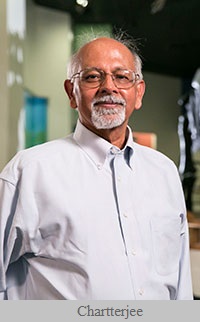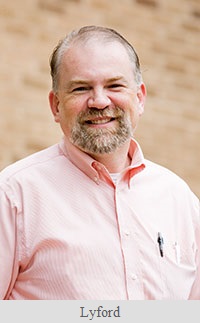Three Faculty Members Receive Fulbright Grants
Prestigious grants fund research in agribusiness, student exchange and meteor scenario.
Three professors at Texas Tech University recently received faculty Fulbright U.S. Scholar grants. Sankar Chatterjee, Horn Professor of Paleontology and Curator at the Museum of Texas Tech University; Rich Rice, associate professor of English; and Conrad Lyford, associate professor of agricultural and applied economics; are Texas Tech's recipients for 2014-2015. The three join approximately 800 other U.S. faculty and professional recipients to lecture and conduct research in 140 countries around the world.
Chatterjee received the prestigious Fulbright-Nehru Academic and Professional Excellence
Award (Teaching/Research). He will travel in the spring of 2015 to India to continue
his ongoing research on his Shiva crater hypothesis, which, along with the Chicxulub
crater of Mexico, has been linked to the dinosaur extinction 65 million years ago.
“The Shiva crater is about 500 kilometers in diameter, and we discovered it from geophysical
evidence and drill core samples in the Mumbai Offshore Basin on the western continental
shelf of India,” Chatterjee said. “The crater is largely submerged and buried by a
2- to 7-kilometer-thick strata and is the largest oilfield in India. I've been invited
to participate in the Koyna Drilling Project to study the core samples that may unravel
the genesis of the Shiva crater.”
Rice, who specializes in technical communication and rhetoric, earned a Fulbright award to teach and do research during the fall of 2014 at Delhi University in India. While there, he will work on a project titled Shifting Programmatic Studies in U.S.-India English/Communication and Study Abroad Programs. The project will help Rice determine how to best set up a study abroad exchange between India and Texas Tech.
“The Fulbright U.S. Scholars program is an excellent opportunity for integrated scholars at Texas Tech working to enrich their understanding of intercultural communication to improve diverse teaching, research, and service,” Rice said.
Lyford will travel to Hawassa University in Ethiopia to work with Ethiopian educators
and researchers to facilitate agribusiness development and value chain rationalization.
The Ethiopian economy is strongly agriculturally based, and there should be many opportunities
to develop joint projects of interest, improve intercultural understanding and develop
long-term relationships.
“Receiving this Fulbright means enhanced opportunities to work in agricultural development
in Feed the Future countries that are currently a focus of efforts by the U.S. government/U.S.
Agency for International Development for development assistance,” Lyford said. “This
should build on Texas Tech' growing partnerships with Ethiopian universities.”
Recipients of Fulbright awards are selected on the basis of academic or professional achievement as well as demonstrated leadership potential in their fields. The Fulbright Program, America's flagship international educational exchange program, is sponsored by the U.S. Department of State's Bureau of Educational and Cultural Affairs.
The program was established in 1946 under legislation introduced by the late Sen.
J. William Fulbright of Arkansas. Since its inception, the Fulbright Program has provided
more than 108,000 Americans who have studied, taught or researched abroad and more
than 178,000 students, scholars and teachers from other countries who have engaged
in similar activities in the United States with the opportunity to observe each other's
political, economic, educational and cultural institutions. The program operates in
more than 155 countries worldwide.
The Council for International Exchange of Scholars, under a cooperative agreement
with the United States Department of State, administers the Fulbright Scholar Program
for faculty and professionals. Each year, the traditional program sends some 800 U.S.
faculty and professionals to 140 countries to lecture, research or participate in
seminars. At the same time, approximately 800 foreign faculty members come to the
United States each year.
“These three Fulbright recipients reflect the high level of research and teaching our faculty engage in daily at Texas Tech University,” said Texas Tech President M. Duane Nellis. “Through their research, Drs. Chatterjee, Rice, and Lyford are elevating Texas Tech as one of the emerging national research institutions.”



International Affairs
-
Address
601 Indiana Avenue, Lubbock, TX 79409-5004 -
Phone
806.742.3667 -
Email
oia.reception@ttu.edu
